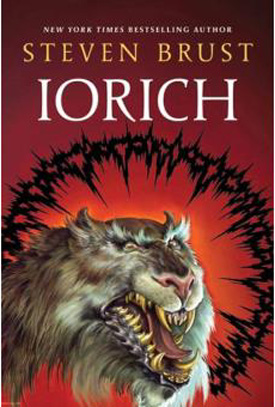 I’ve noted before how Steven Brust manages to keep an ongoing series alive by the simple expedient of presenting the protagonist with new challenges in each volume. In Iorich, the latest installment of The Taltos Cycle, he’s presented Vlad Taltos — and us — with another mystifying quandary.
I’ve noted before how Steven Brust manages to keep an ongoing series alive by the simple expedient of presenting the protagonist with new challenges in each volume. In Iorich, the latest installment of The Taltos Cycle, he’s presented Vlad Taltos — and us — with another mystifying quandary.
Vlad is still on the run from House Jhereg, but one thing guaranteed to bring him out of hiding and back to Adrilankha is a threat to someone he loves. In Dzur, it was a threat to his estranged wife, Cawti. In Iorich, the threat is to Aliera e’Kieron, until recently Dragon Heir to the Throne and Warlord. She’s no longer Dragon Heir because another Heir has been found, Norilar e’Lanya, formerly a Jhereg assassin and Cawti’s partner. Aliera is no longer Warlord because she’s been arrested for a capital crime: the practice of Elder Sorcery. (A note: if you backed Vlad into a corner and threatened him with something sufficiently dire, like physical pain, he might admit that he cares for Aliera a great deal. Aliera would be incensed at the idea — at least, publicly.) Aliera being Aliera, she has refused to retain an advocate and also refused to see her friends. Vlad being Vlad, he gets into see her anyway, and to agree to legal counsel.
Of course, the whole thing stinks: the obvious question is, since everyone knew that Aliera was practicing pre-Empire sorcery anyway, why has she been arrested now? And what does a peasant massacre in a remote village have to do with it? And how do legal hallucinogens work into the equation? Vlad, of course, decides to find out. (And, lest you think this is going to be some sort of bloodless intellectual exercise, remember that the House of the Iorich is concerned not only with justice, but with retribution.)
A lot of the fun in the Taltos Cycle is watching Vlad put the pieces together. One is tempted to call forth the memory of Rex Stout’s Nero Wolfe — I’ve long thought of Vlad as a combination of Wolfe and Archie Goodwin, his legman, and the stories of Vlad Taltos are, when it comes right down to it, detective fiction — but Wolfe worked by logic, and Vlad most certainly does not. The game here is really pretty standard for Vlad — talking to people who tell him things they don’t know they’re telling him — or tell him things they can’t tell him by telling him something else. (Sethra Lavode is really good at that.) And Vlad does have a knack for putting seemingly unrelated elements together and coming up with something.
One finds oneself using the same techniques to put the story together. Dialogue, especially, is more markedly elliptical than I can remember it being in other volumes in the series, and yet one can see, more or less clearly, where the story is headed as each conversation takes place. Don’t take me wrong — the mystery remains a mystery until Brust is good and ready to let us in on it, but we can see directions and possibilities growing from Vlad’s encounters with his friends and with total strangers, and from whose names get dropped in the course of casual conversations. It’s a lot of fun.
One other technique Brust uses to maintain our interest in what may very well be, if we can believe Brust’s own statement, a seventeen-volume epic: Vlad changes. He’s an older and much wiser man than the brash assassin of Yendi or Taltos, and it shows. He still has a mouth that’s asking for trouble, but it seems to be under better control now — mostly he gets into trouble when he’s at least almost ready for it. The same holds true of other characters, with the possible exception of Aliera, who is still an arrogant Dragonlord, but even there, we see layers of motivation. Sethra, Norathar, the Empress Zerika, Cawti, and even Kragar seem to have greater depth in Iorich than I’ve seen before (and I’ve read them all).
I’m a great admirer of artists who work with economy of means, and Brust is one of those artists. Granted, he’s building on eleven prior volumes of experience here, but by the same token, he feels no need to beat us over the head with the obvious, which I value highly. And even with that economy, Brust has built a very rich narrative.
I don’t necessarily recommend this one for those who are new to the series, but I do highly recommend it for anyone who has prior exposure to Vlad and the somewhat singular people who tend to surround him.
(Tor, 2010)
